The biocatalytic APIs market is projected to grow from USD 2,138.6 million in 2025 to approximately USD 4,129.0 million by 2035, recording an absolute increase of USD 1,990.4 million over the forecast period. This translates into a total growth of 93.1%, with the market forecast to expand at a compound annual growth rate (CAGR) of 6.8% between 2025 and 2035.
The overall market size is expected to grow by nearly 1.9X during the same period, supported by increasing demand for sustainable pharmaceutical manufacturing, growing adoption of biotechnology solutions, and rising focus on environmentally friendly API production across the global pharmaceutical and biopharmaceutical sectors.
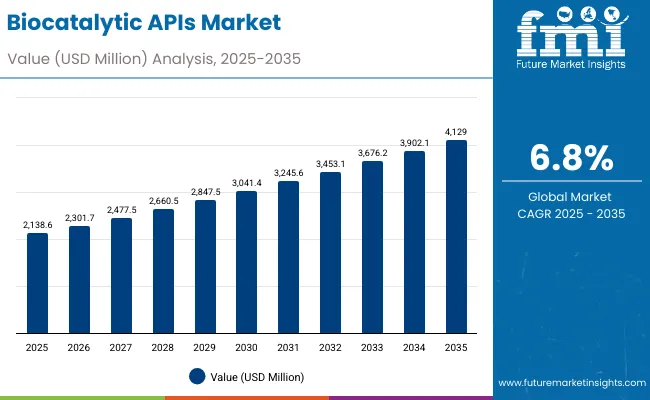
Biocatalytic APIs Market Key Takeaways
| Metric | Value |
|---|---|
| Estimated Value in (2025E) | USD 2,138.6 million |
| Forecast Value in (2035F) | USD 4,129.0 million |
| Forecast CAGR (2025 to 2035) | 6.8% |
Between 2025 and 2030, the biocatalytic APIs market is projected to expand from USD 2,138.6 million to USD 2,971.6 million, resulting in a value increase of USD 833.0 million, which represents 41.8% of the total forecast growth for the decade. This phase of development will be shaped by increasing adoption of sustainable manufacturing processes, rising demand for green chemistry solutions, and growing utilization in pharmaceutical and biopharmaceutical applications. Biotechnology companies and pharmaceutical manufacturers are expanding their biocatalytic capabilities to address the growing preference for environmentally sustainable API production methods.
From 2030 to 2035, the market is forecast to grow from USD 2,971.6 million to USD 4,129.0 million, adding another USD 1,157.4 million, which constitutes 58.2% of the overall ten-year expansion. This period is expected to be characterized by the expansion of advanced biotechnology solutions, the integration of AI-powered enzyme optimization systems for premium biocatalytic products, and the development of enhanced process efficiency features for specialized applications. The growing emphasis on sustainable pharmaceutical manufacturing and process optimization will drive demand for intelligent biocatalytic systems with enhanced performance capabilities and improved cost-effectiveness.
Between 2020 and 2024, the biocatalytic APIs market experienced steady growth, driven by increasing sustainability awareness and growing recognition of biocatalytic systems' superior environmental benefits across pharmaceutical and biotechnology applications. The market developed as pharmaceutical companies recognized the potential for biocatalytic technology to enhance process efficiency while meeting modern regulatory requirements for sustainable manufacturing and environmental responsibility. Technological advancement in enzyme engineering and bioprocess optimization began emphasizing the critical importance of maintaining production quality while reducing environmental impact and improving cost effectiveness.
Market expansion is being supported by the increasing global demand for sustainable pharmaceutical manufacturing and the corresponding shift toward biocatalytic technologies that can provide superior environmental benefits while meeting regulatory requirements for green chemistry and process sustainability. Modern pharmaceutical manufacturers and biotechnology companies are increasingly focused on incorporating biocatalytic systems to enhance production efficiency while satisfying demands for advanced biotechnology solutions and environmentally responsible manufacturing processes. Biocatalytic APIs' proven ability to deliver superior process selectivity, reduced environmental impact, and cost-effective production capabilities makes them essential technologies for pharmaceutical manufacturing and API development applications.
The growing emphasis on sustainable manufacturing and regulatory compliance is driving demand for high-quality biocatalytic solutions that can support distinctive production processes and comprehensive environmental stewardship across pharmaceutical, biopharmaceutical, and specialty chemical categories. Pharmaceutical manufacturer preference for technologies that combine production efficiency excellence with environmental sustainability is creating opportunities for innovative biocatalytic implementations in both large-scale manufacturing and specialty production applications. The rising influence of green chemistry initiatives and sustainable development goals is also contributing to increased adoption of premium biocatalytic solutions that can provide authentic sustainability characteristics.
The market is segmented by source, application type, and end user. The demand for sources is divided into microorganisms, plants, animals, and others. Based on application type, the market is categorized into biopharmaceuticals, food & beverages, agriculture & feed, and others. The end user segment includes pharmaceutical & biopharma companies, chemical industry, food and beverages company, and others.
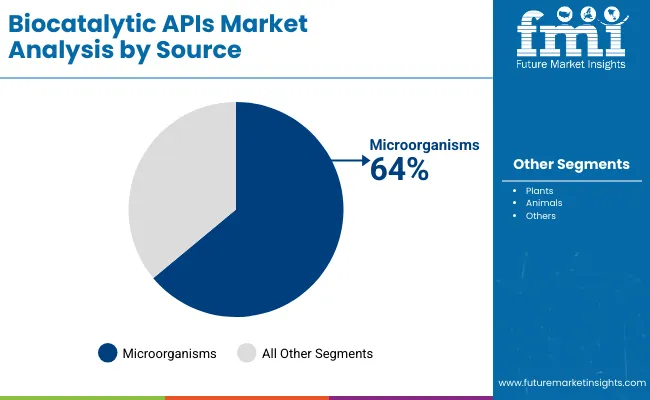
The microorganisms segment is projected to account for 64.0% of the biocatalytic APIs market in 2025, reaffirming its position as the leading source category. Biotechnology companies and pharmaceutical manufacturers increasingly utilize microorganism-based biocatalytic technology for their superior scalability, process flexibility, and cost-effectiveness in large-scale API production applications across diverse industrial settings. Microorganism technology's standardized cultivation methods and proven performance directly address the manufacturing requirements for consistent API production and reliable process outcomes in biocatalytic operations.
This source segment forms the foundation of modern sustainable pharmaceutical manufacturing applications, as it represents the technology with the greatest scalability potential and established compatibility across multiple production systems. Manufacturer investments in strain optimization and bioprocess enhancement continue to strengthen adoption among pharmaceutical producers. With pharmaceutical companies prioritizing sustainability and cost-effectiveness, microorganism-based biocatalytic systems align with both environmental objectives and production efficiency requirements, making them the central component of comprehensive sustainable manufacturing strategies.
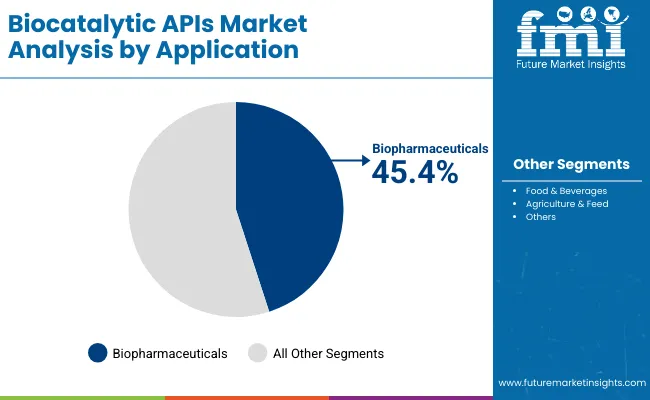
Biopharmaceutical applications are projected to represent the largest share of biocatalytic APIs demand in 2025 at 45.4%, underscoring their critical role as the primary application for sustainable manufacturing technologies in pharmaceutical production and drug development protocols. Pharmaceutical manufacturers and biotechnology companies prefer biocatalytic systems for their exceptional process selectivity, environmental benefits, and ability to maintain product quality while supporting complex molecule synthesis requirements during pharmaceutical manufacturing processes. Positioned as essential technologies for advanced pharmaceutical production, biocatalytic systems offer both sustainability enhancement and product quality advantages.
The segment is supported by continuous growth in biopharmaceutical development and the growing availability of advanced biotechnology solutions that enable enhanced manufacturing outcomes and environmental responsibility at the pharmaceutical production level. Additionally, pharmaceutical systems are investing in sustainable manufacturing technologies to support regulatory compliance and environmental stewardship optimization. As pharmaceutical manufacturing continues to evolve and producers seek superior sustainability solutions, biopharmaceutical applications will continue to dominate the application landscape while supporting technology advancement and manufacturing optimization strategies.
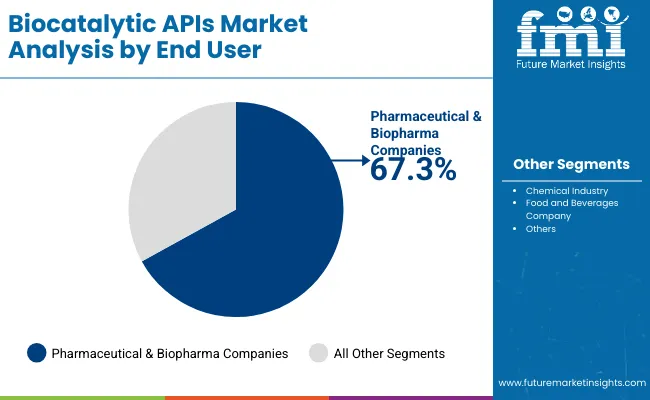
Pharmaceutical & biopharma companies are projected to represent the largest share of biocatalytic APIs demand in 2025 at 67.3%, emphasizing their position as the primary end user for sustainable manufacturing technologies in drug production and pharmaceutical development applications. These companies prefer biocatalytic solutions for their proven sustainability benefits, regulatory compliance advantages, and ability to enhance manufacturing efficiency while reducing environmental impact during pharmaceutical production processes. As the leading adopters of advanced biotechnology, pharmaceutical and biopharma companies drive innovation and market development in biocatalytic API applications.
The biocatalytic APIs market is advancing steadily due to increasing demand for sustainable pharmaceutical manufacturing and growing regulatory pressure for environmentally friendly production processes that emphasize superior sustainability across pharmaceutical development and large-scale manufacturing applications. However, the market faces challenges, including high initial investment costs compared to traditional chemical synthesis, technical complexity in enzyme optimization and scale-up, and competition from established chemical manufacturing processes. Innovation in enzyme engineering and process optimization continues to influence market development and expansion patterns.
Expansion of Sustainable Manufacturing Protocols
The growing adoption of biocatalytic systems in comprehensive pharmaceutical manufacturing and sustainable production applications is enabling pharmaceutical companies to develop protocols that provide distinctive environmental benefits while commanding premium positioning and enhanced regulatory compliance characteristics. Advanced manufacturing protocols provide superior sustainability while allowing more sophisticated process optimization across various pharmaceutical categories and production segments. Pharmaceutical systems are increasingly recognizing the competitive advantages of sustainable manufacturing positioning for comprehensive production development and specialty pharmaceutical market penetration.
Integration of Advanced Enzyme Engineering and AI Analytics
Modern biocatalytic suppliers are incorporating advanced enzyme optimization algorithms, machine learning systems, and computational design technologies to enhance catalytic efficiency, improve selectivity, and meet pharmaceutical manufacturer demands for intelligent and reliable biotechnology solutions. These programs improve process performance while enabling new applications, including personalized medicine manufacturing and complex molecule synthesis systems. Advanced AI integration also allows suppliers to support premium market positioning and technological excellence leadership beyond traditional chemical synthesis methods.
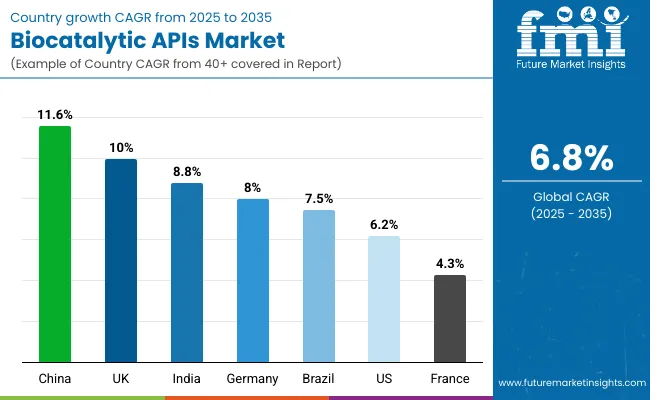
| Countries | CAGR (2025 to 2035) |
|---|---|
| China | 11.6% |
| UK | 10.0% |
| India | 8.8% |
| Germany | 8.0% |
| Brazil | 7.5% |
| USA | 6.2% |
| France | 4.3% |
The biocatalytic APIs market is experiencing robust growth globally, with China leading at an 11.6% CAGR through 2035, driven by expanding biotechnology infrastructure, rising pharmaceutical manufacturing capabilities, and increasing adoption of sustainable production technologies. The UK follows at 10.0%, supported by growing biotechnology investments, expanding research and development capabilities, and rising focus on green chemistry initiatives. India shows growth at 8.8%, emphasizing pharmaceutical manufacturing modernization and expanding biotechnology capabilities.
Germany demonstrates 8.0% growth, prioritizing advanced biotechnology innovation and comprehensive sustainable manufacturing solutions. Brazil records 7.5%, focusing on pharmaceutical industry development and biotechnology adoption. Europe exhibits 6.6% growth, supported by established pharmaceutical infrastructure and advanced biotechnology adoption. The USA demonstrates 6.2% growth, emphasizing innovation excellence and market maturity priorities. France shows 4.3% growth, focusing on biotechnology integration and high-quality pharmaceutical solutions.
The report covers an in-depth analysis of 40+ countries; eight top-performing countries are highlighted below.
Revenue from biocatalytic APIs in China is projected to exhibit exceptional growth with a CAGR of 11.6% through 2035, driven by expanding biotechnology infrastructure and rising capabilities in pharmaceutical manufacturing across major industrial and biotechnology centers. The country's growing pharmaceutical sector and increasing adoption of sustainable manufacturing technologies are creating substantial demand for biocatalytic solutions in both domestic and export manufacturing applications. Major biotechnology companies and pharmaceutical manufacturers are establishing comprehensive production and research capabilities to serve both Chinese healthcare needs and international export markets.
Revenue from biocatalytic APIs in the UK is expanding at a CAGR of 10.0%, supported by growing biotechnology investments, increasing research and development capabilities, and expanding pharmaceutical infrastructure with advanced manufacturing capabilities. The country's developing biotechnology ecosystem and expanding pharmaceutical sector are driving demand for sophisticated biocatalytic solutions across both established pharmaceutical companies and emerging biotechnology firms. International biotechnology companies and domestic pharmaceutical manufacturers are establishing comprehensive research and production capabilities to address growing market demand for sustainable manufacturing solutions.
Revenue from biocatalytic APIs in India is projected to grow at a CAGR of 8.8% through 2035, driven by pharmaceutical manufacturing expansion initiatives, growing biotechnology capabilities, and increasing focus on sustainable production requiring advanced biotechnology solutions. India's developing pharmaceutical infrastructure and increasing emphasis on environmental sustainability are creating substantial demand for both standard and premium biocatalytic varieties. Leading biotechnology companies and pharmaceutical manufacturers are establishing comprehensive production strategies to serve both Indian markets and growing international pharmaceutical demand.
Revenue from biocatalytic APIs in Germany is projected to grow at a CAGR of 8.0% through 2035, supported by the country's advanced biotechnology sector, innovation leadership capabilities, and established market for premium sustainable manufacturing solutions. German pharmaceutical manufacturers and biotechnology companies prioritize environmental excellence, production efficiency, and technological advancement, making biocatalytic systems essential technologies for both pharmaceutical manufacturing and specialty chemical production. The country's comprehensive biotechnology ecosystem and manufacturing adoption patterns support continued market development.
Revenue from biocatalytic APIs in Brazil is projected to grow at a CAGR of 7.5% through 2035, supported by the country's pharmaceutical industry development initiatives, expanding biotechnology capabilities, and established expertise in sustainable manufacturing applications. Brazilian pharmaceutical manufacturers' focus on production efficiency, environmental responsibility, and technological innovation creates growing demand for advanced biotechnology solutions. The country's attention to pharmaceutical development and sustainability drives consistent adoption across both traditional manufacturing and emerging biotechnology applications.
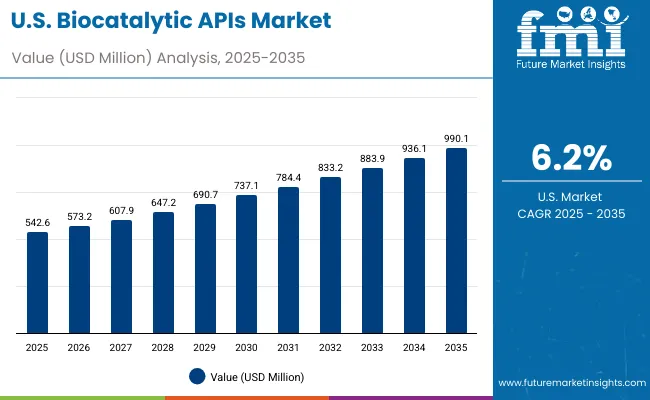
Revenue from biocatalytic APIs in the United States is projected to grow at a CAGR of 6.2% through 2035, supported by the country's biotechnology innovation sector, advanced pharmaceutical capabilities, and established reputation for producing superior biotechnology solutions while working to enhance manufacturing sustainability and develop high-quality biocatalytic technologies. The USA biotechnology industry continues to benefit from its reputation for innovation excellence while focusing on technological advancement and manufacturing precision.
Revenue from biocatalytic APIs in France is projected to grow at a CAGR of 4.3% through 2035, supported by the country's biotechnology precision sector, advanced manufacturing capabilities, and established focus on quality and regulatory compliance while working to enhance biotechnology integration and develop premium manufacturing solutions. France's pharmaceutical industry continues to benefit from its reputation for quality excellence while focusing on sustainable development and manufacturing precision.
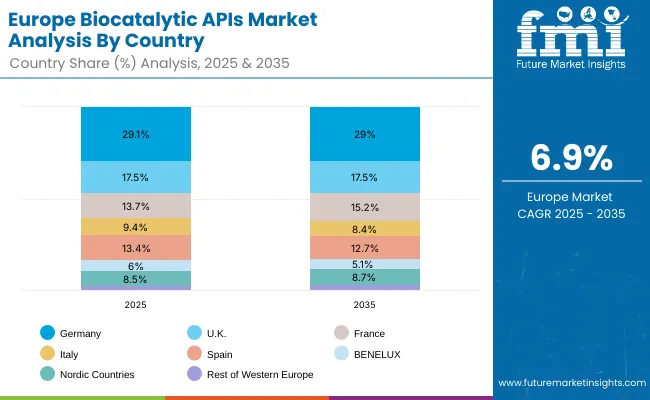
The biocatalytic APIs market in Europe is projected to grow at a CAGR of 6.6% from 2025 to 2035. Germany is expected to maintain its leadership position with a 29.1% market share in 2025, declining slightly to 29.0% by 2035, supported by its advanced biotechnology sector, comprehensive pharmaceutical infrastructure, and innovation capabilities serving regional and international markets.
The United Kingdom follows with a 17.5% share in 2025, projected to maintain 17.5% by 2035, driven by priorities in biotechnology advancement, innovation excellence, and sustainable manufacturing. France holds a 13.7% share in 2025, expected to increase to 15.2% by 2035, supported by biotechnology integration and pharmaceutical development, though facing challenges from competition and market dynamics.
Spain accounts for 13.4% in 2025, projected to ease to 12.7% by 2035, while Italy contributes 9.4% in 2025, declining to 8.4% by 2035. The Nordic Countries represent 8.5% in 2025, increasing to 8.7% in 2035, while BENELUX holds 6.0% in 2025, declining to 5.1% by 2035. The Rest of Western Europe region is expected to account for 2.5% in 2025, increasing to 3.5% by 2035, reflecting mixed growth dynamics across smaller and developing markets.
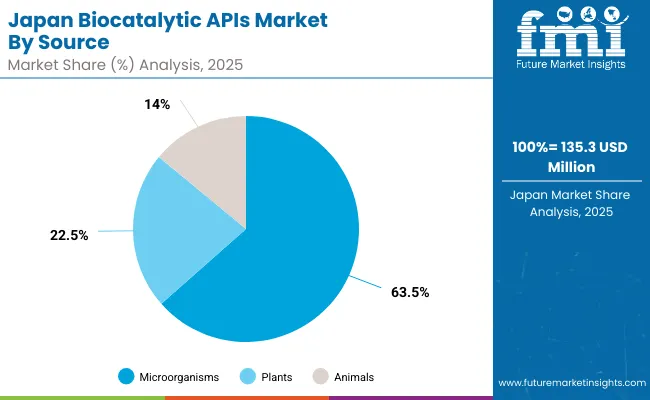
The biocatalytic APIs market in Japan is projected to grow steadily from 2025 to 2035, supported by advanced biotechnology infrastructure, a strong pharmaceutical ecosystem, and adoption of sustainable manufacturing technologies.
Microorganisms are expected to maintain their leadership position with a 63.5% market share in 2025, reflecting consistent demand in pharmaceutical manufacturing and biotechnology applications. Plants follow with 22.5% in 2025, supported by growing adoption across specialty applications and natural product synthesis.
Animals hold 14.0% in 2025, leveraging Japan's advanced biotechnology capabilities and specialized pharmaceutical requirements.
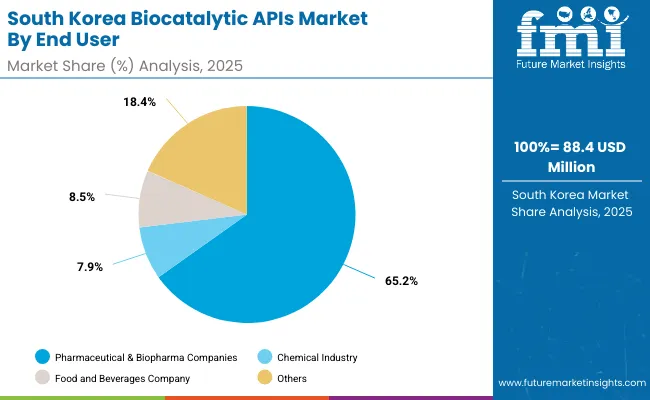
The biocatalytic APIs market in South Korea is projected to expand through 2035, driven by rapid adoption of biotechnology solutions, strong pharmaceutical integration, and increasing reliance on sustainable manufacturing processes.
Pharmaceutical & Biopharma Companies are expected to maintain their leadership with a 65.2% market share in 2025, supported by strong pharmaceutical industry development and favorable government policies for biotechnology advancement. Food and Beverages Company follows with 8.5% in 2025, reflecting South Korea's growing food technology sector and biotechnology integration in food processing.
Chemical Industry accounts for 7.9% in 2025, supported by industrial biotechnology adoption and sustainable chemical manufacturing. Others represent 18.4% in 2025, encompassing diverse applications across various industrial sectors.
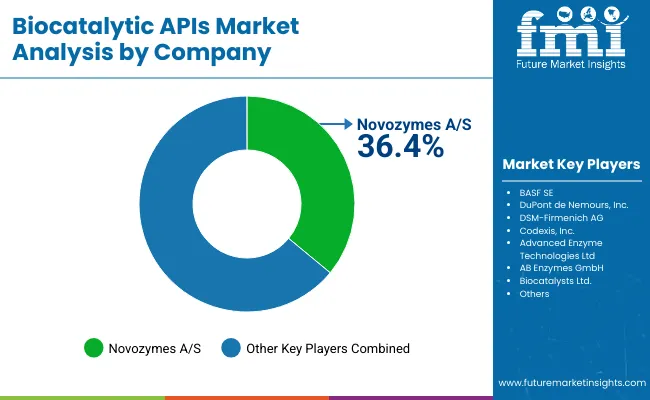
The biocatalytic APIs market is characterized by competition among established biotechnology companies, specialized enzyme manufacturers, and integrated pharmaceutical technology suppliers. Companies are investing in advanced enzyme engineering technologies, process optimization systems, application-specific product development, and comprehensive technical support capabilities to deliver consistent, high-performance, and reliable biocatalytic solutions. Innovation in catalytic efficiency enhancement, process scalability, and customized pharmaceutical compatibility is central to strengthening market position and manufacturer satisfaction.
Novozymes A/S leads the market with a 36.4% share, focusing on comprehensive biotechnology solutions and advanced enzyme technologies, offering premium biocatalytic products with emphasis on innovation excellence and sustainable manufacturing capabilities. Other key players provide specialized biotechnology and pharmaceutical solutions with focus on innovation and technical support. BASF SE delivers integrated chemical and biotechnology solutions with emphasis on industrial application and operational excellence. DuPont de Nemours, Inc. specializes in biotechnology solutions with focus on performance optimization and manufacturing reliability. DSM-Firmenich AG focuses on sustainable biotechnology with emphasis on advanced enzyme systems and pharmaceutical applications.
| Items | Values |
|---|---|
| Quantitative Units (2025) | USD 2,138.6 million |
| Source | Microorganisms, Plants, Animals |
| Application Type | Biopharmaceuticals, Food & Beverages, Agriculture & Feed, Others |
| End User | Pharmaceutical & Biopharma Companies, Chemical Industry, Food and Beverages Company, Others |
| Regions Covered | North America, Europe, East Asia, South Asia & Pacific, Latin America, Middle East & Africa |
| Countries Covered | United States, Brazil, China, India, Germany, France, United Kingdom, Japan, South Korea and 40+ countries |
| Key Companies Profiled | Novozymes A/S, BASF SE, DuPont de Nemours, Inc., DSM-Firmenich AG, Codexis, Inc., Advanced Enzyme Technologies Ltd, AB Enzymes GmbH, Biocatalysts Ltd. |
| Additional Attributes | Dollar sales by source, application type, and end user, regional demand trends, competitive landscape, technological advancements in biotechnology, sustainable manufacturing initiatives, pharmaceutical integration programs, and environmental excellence enhancement strategies |
By North America
By Europe
By East Asia
By South Asia & Pacific
By Latin America
By Middle East & Africa
The global biocatalytic APIs market is valued at USD 2,138.6 million in 2025.
The size for the biocatalytic APIs market is projected to reach USD 4,129.0 million by 2035.
The biocatalytic APIs market is expected to grow at a 6.8% CAGR between 2025 and 2035.
The key source segments in the biocatalytic APIs market are microorganisms, plants, and animals.
In terms of application type, biopharmaceuticals segment is set to command 45.4% share in the biocatalytic APIs market in 2025.
Explore Similar Insights

Thank you!
You will receive an email from our Business Development Manager. Please be sure to check your SPAM/JUNK folder too.
Chat With
MaRIA